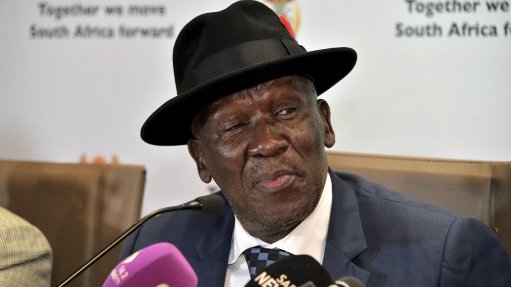
Police Minister Bheki Cele on Monday called on municipalities and other stakeholders to become more proactive in removing the root causes leading to violent protests.
Cele said it was worrying that protests were often violent and dangerous, adding that communities turned to violent demonstrations if and when they felt their voices were not heard and when their basic needs were not met.
He was speaking during the release of the Panel of Experts Report on Policing and Crowd Management of the South African Police Service (Saps), saying while the report had taken some time to be released, he wanted to assure South Africans that accountability was in motion and that the process around the Marikana tragedy is ongoing.
On August 16, 2012 Saps shot dead striking miners outside the Lonmin platinum mine, on the outskirts of Marikana.
Cele said the mass shooting of 34 mine workers forced the Saps to correct where it went wrong.
In 2012 the Farlam Commission of Inquiry was appointed to investigate the incident and it eventually requested that a panel of experts be set up to revise and amend public-order policing policies.
This panel, appointed following the findings and recommendations of the commission, was chaired by the late Judge David Sakelene Vusimuzi Ntshangase.
Cele said the tragedy of Marikana was burned in the minds of South Africans, more so for those who lost their fathers, uncles, sons and breadwinners on that day.
“We as a country have come a long way since that fateful day in Marikana. Never in the history of this country has an event of this nature been interrogated so rigorously and in such detail,” he added.
Saps Public Order Policing Unit
To date the Saps has paid out R176-million to compensate families of the miners killed. R18-million worth of civil claims are yet to be finalised. The process to finalise other categories of compensations is also ongoing.
“The Marikana Commission is unequivocal in its call to the Saps to address the systematic problems related to the governance, leadership and accountability. Legislative reforms to deal specifically with this have commenced,” Cele explained.
He assured the nation that the Saps Public Order Policing Unit is better resourced today, with nearly R580-million spent on resourcing and capacitating the unit.
A total of 6 324 officers have been trained through numerous courses and many have been trained to use specialised equipment within the public order policing environment including the use of water cannons and stun grenades.
Cele said the recent killing of a bystander, Mthikozisi Ntumba, during protests at the University of the Witwaterssrand in Johannesburg had once again cast a spotlight on the use of rubber bullets, saying the issue had been raised stridently by the members of the panel.
He said the use of rubber bullets as a means of crowd control management was being looked into urgently by relevant structures and police management.
However, Police Commissioner General Khehla Sitole has said that the Saps would not stop the use of rubber bullets but would rather change the standard operating procedure and issue a new national instruction on how rubber bullets were used.
Sithole said there would be stricter provisions relating to the police's use of rubber bullets, adding that the Saps would further prescribe the issue of distance.